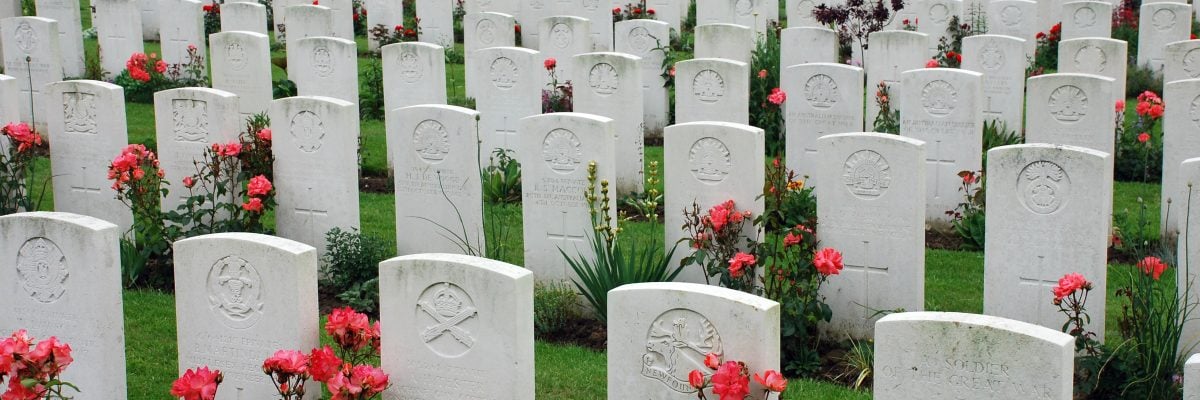
Homily for the Thirty-Second Sunday in Ordinary Time, Year B
He sat down opposite the treasury
and observed how the crowd put money into the treasury.
Many rich people put in large sums.
A poor widow also came and put in two small coins worth a few cents.
Calling his disciples to himself, he said to them,
“Amen, I say to you, this poor widow put in more
than all the other contributors to the treasury.
For they have all contributed from their surplus wealth,
but she, from her poverty, has contributed all she had,
her whole livelihood.”— Mark 12:38-44
“We perceive practically before our eyes such a rich supply of men, in the flower of their age, falling in war to an untimely death.”
These are the anguished words of Pope Benedict XV in his decree Incruentum, published one year into the so-called “Great War,” or World War I. In this decree he gave to all Catholic priests throughout the world the privilege of offering Holy Mass three times on All Souls’ Day each year. His motive was the enormous, almost incalculable number of men who had fallen in the war, often without the possibility of last rites and funeral masses and Christian burial.
Imagine, if you can, that about five million men fell in battle on the Allied side and four million on the side of the Central Powers. The Russians alone lost more than a million, the British a million, and so on. No country, practically, was spared this horrible carnage. And these round figures only refer to military deaths, not even including the civilian population. Let it be simply said that at least forty million souls, military and civilian, died in that great conflict.
The pope was a sad but perceptive prophet at the beginning of the last century, since of course there was to be barely twenty years later another universal war with similarly overwhelming losses.
The widow in the Gospel lesson today so beautifully praised by the Savior was contributing to the temple to fund the sacrifices that were daily offered for the living and the dead, in thanksgiving to God and in reparation for sin and for the obtaining of graces and blessings.
Each one of us might ask a question: how often have I offered sacrifices, especially the sacrifice of the Holy Mass, the fulfillment of the sacrifices of the old temple, for the departed? Have I at least remembered my own dear dead and ancestors? Have I remembered all those who have had no one to pray for them?
The Catechism of the Catholic Church promulgated by St. John Paul II teaches clearly that the best means of assisting the departed is to have the Holy Mass offered for the hastening of their entry into heaven (see 1032). The Catholic heart understands this instinctively, for surely the offering of the body and blood of the Son of God and Son of Mary is the most powerful and effective sacrifice.
Consider that the first thing Our Lord did upon completing the work of redemption on the wood of the cross was to descend among the dead to liberate them and give them the vision of the Holy Trinity. Imagine how zealously Our Lord looked forward to this supreme work of charity. All of the ancestors of the human race from Adam and Abel to St. Joseph entered into their rest by the coming of the glorious Savior, robed in the splendor of his victory in his war against the world, the flesh, and the Evil One.
We, too, should descend among the dead, and in this way share in the thoughts of the heart of the Savior. And just as the widow who gave her last penny, we should not hesitate to give of our resources for Mass intentions for the departed in general as well as our own families’ dead.
This is not money-grubbing on the part of the clergy. Let us not believe the calumnies of the enemies of the sacrifice of the cross, the sacrifice of the holy Mass. Imagine if the poor old woman in the Gospel had had today’s cynical, critical spirit. Instead, she did what Jesus, Mary, and Joseph did: they did not look to the holiness of the ministers of the temple in the first place but rather to the holiness and power of the offerings established by the God of Israel in the law. Let us do the same and have a great confidence in the power of the holy Mass to relieve and refresh and to set free the holy souls detained in purgatory.
In this way, we will gain for ourselves also a title to a special mercy from the Lord of hosts when we ourselves will most certainly be found among the dead.
Eternal rest grant unto them O Lord, and let perpetual light shine upon them!
Photo: Tyne Cot WWI Cemetery, Belgium



